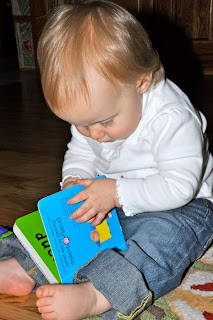Anyway, back to Michael Pollan. Since reading IDF, my husband and I have changed much of the ways that we eat. This is one of the books that I did not flush all the content of after finishing the last page. Pollan's basic premise (in a very oversimplified nutshell) is encouraging people to eat real food, not processed junk. He encourages you to actually read the labels of your food. And when I started doing this, I was kind of grossed out by all the junk in some of the items I used to buy. Now when I go to the grocery store I mostly buy whole foods like fruits, vegetables, lean meats, and milk. I also buy other dairy products like cheeses, and some other prepared items, though I only buy these if I can pronounce and know what the ingredients are. I also buy primarily organic foods to avoid pesticides and other chemicals as well as help the environment as much as I can. I should note that I learned not to assume that "organic" meant that a food was free of all the crazy processed junk I am trying to avoid though. I bought a can of organic soup once in a hurry without reading the label. I have purchased various soups (Amy's brand are fantastic!) that have pretty much only veggies and broth in them, and sometimes use these as a quick lunch for Miss. But the one time I grabbed a can of organic soup that sounded tasty and didn't read the label, I got it home to find out that it was full of all the same junk as many non-organic soups. So, lesson learned. "Organic" does not always mean "better."
Don't get me wrong. I won't refuse to eat something that isn't organic. I have been known to pig out on Culver's or pizza on occasion. I'd rather eat lots of different veggies and fruits, even if some of them are not available organically grown. I have yet to find organic asparagus or brussels sprouts in the produce section, but I don't stop buying those. I buy what I can find organic, and the rest I get non-organic. I do try to avoid buying certain items unless they are organic. There is a list of "dirty dozen" fruits and veggies that tend to absorb or somehow hold onto pesticides more than other items (I have read of this in several places but do not know the original source for the study that tested this). These include spinach, celery, bell peppers, potatoes, apples, peaches, pears, strawberries, raspberries, imported grapes, cherries, and nectarines. Another source I like because it provides both sides of the "organic debate" can be checked out here. This site also recommends buying only organic green peas, green beans, scallions, and blackberries.
Another way that my shopping and eating has changed is that I make a point of trying to buy food that is grown and/or produced locally. I never used to pay attention to where my food came from. But this is another point that Pollan raises in his book. It makes sense to me for many reasons, so my hubby and I have been working on trying to eat more local foods for a while now. Starting this spring, we are really going to challenge ourselves to try to eat the great majority of our foods from local sources, within about 100 miles of our home, with some reasonable exceptions. I did a guest blog post about this for the Suburban Saving Mama blog that you can check out here if you want to read more about why and how we are planning to go local.
So I guess the point of this whole post is that I like thinking about and talking about food and books. And Michael Pollan's "In Defense of Food" is a great way to do both. It really is a great book. In fact, I think it's about time for me to read it again. And he recently came out with a new book called "Food Rules." I hinted very strongly to my hubby that I would like this book for my birthday. Well, okay I flat out asked him to get it for me but that's how we roll in our house. So I'm keeping my fingers crossed that I will soon be reading a copy of "Food Rules." I'll let you know how it is! Another book that was recently recommended to me by my father-in-law as discussing similar ideas to those put forth in IDF but also really getting into the science supporting these suggestions is "Eat, Drink, and Be Healthy: The Harvard Medical School Guide to Healthy Eating" by Walter C. Willett, MD (sounds impressive doesn't it??). I'll tackle that one after "Food Rules."






















































